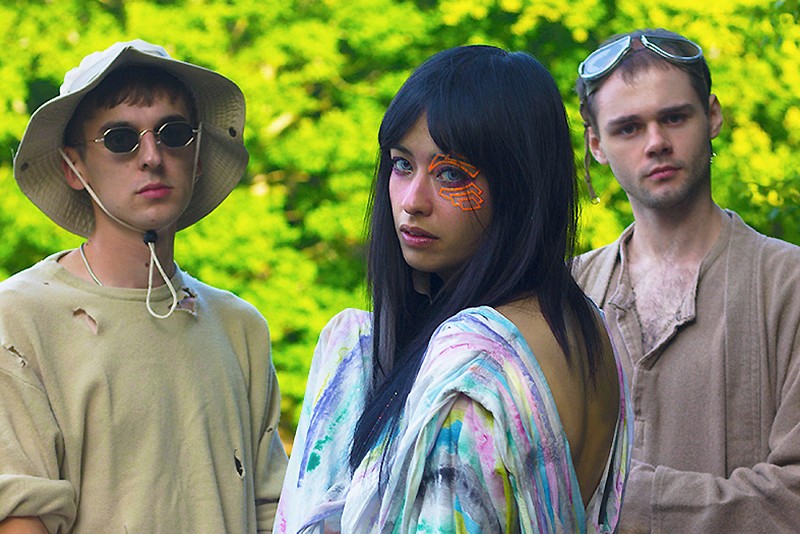Unsurprisingly, Sarah Midori Perry (aka Sarah Bonito) says she and her fellow Kero Kero Bonito bandmates, Gus Lobban and Jamie Bulled, receive many handmade gifts from fans. She has a growing flamingo collection, of course, due in part to Kero Kero Bonito's 2014 song "Flamingo." She lovingly recalls being gifted a handmade shrimp, made from felt, which is also a nod to "Flamingo," a song that finds Perry playfully speculating about how a flamingo came to get its pink color, amid a flurry of handclaps, sounding every bit like an elementary school rhyme that could fittingly accompany skipping rope double dutch.
"How many shrimps do you have to eat/ before you make your skin turn pink/ eat too much and you'll get sick/ shrimps are pretty rich,"Perry sings on "Flamingo" before launching into a Japanese rap.
This is but one side of Kero Kero Bonito, the sugary sweet, London-based, J-pop influenced trio. KKB made their full-length introduction in 2016 with Bonito Generation, a smooth collection of uplifting bilingual raps about growing up and fitting in, layered with Nintendo blips and shoegaze-infused electropop, covering topics that range from being late for school, graduation, life in a fishbowl as a literal fish, and trampolines as a metaphor for getting back up after you fall. As Perry reminds, "Don't forget to bounce."
"I think our approach is often ... where there is negativity, there is always positivity. There are both sides all the time," Perry says. "What we wanna do is kinda convey both sides. The world is ending, but there's still beauty in this world."
The band embraces that beauty even when taking on the world's impending doom, as KKB does on their latest project, Civilisation, a return to a more electronic sound.
The three-song EP, which was surprise-released at the top of their North American tour earlier this month, finds the band stepping back from school-day woes and personal tragedy, as documented on 2018's chaotic and grief- and instrument-driven Time 'n' Place to meditate on the bigger picture: a planet in crisis.
"I think Time 'n' Place was a lot about us looking into our personal lives," Perry says. "I feel like the new stuff is kind of about the world surrounding us right now. Like, I feel when you turn on the TV and you watch the news, it always feels like the world's going to end at any moment. There's always a message behind every song we write and there is a statement for every song, and I feel like for this one, it's the things happening in the world around us that's affecting us more. I don't know how much you know about what's going on in the U.K., but it's kind of similar to the type of situations going on in the U.S. I don't know — it just feels like there's a lot of negative energy around right now, and that definitely affects us when we write music and create artwork."
Born in Japan, Perry was recruited in 2012 by Lobban and Bulled on MixB, an online classifieds site specifically for Japanese expats. Perry, with the exception of playing saxophone in school, had never been in a band, let alone fronted one. Once Perry entered the picture, Lobban and Bulled, both friends since teenagerdom, sort of built the sound around her bilingual bubblegum raps. Lobban has said that the goal was to make "the most direct new pop music you could make."
Civilisation, which Perry alludes to being the first installment in a series of surprises to come, might not read as traditional pop — that's because it's not. Making direct pop, when filtered through KKB's natural evolution, is not unlike an existential Katamari Damacy that's picked up a hyper-synthesized, glitched-out Hocchiku, Sonic the Hedgehog 2's chemical plant, and the sensation of having your hair whipped back by a subway car. Direct pop, according to KKB's unofficial ethos, is about togetherness, through the light, the dark, and the flamingo-shrimp of it all.
"For me, personally, it feels like when we go to other countries, it's really eye-opening for me to see, even though you see stuff on the news, when you actually go to the country, you realize people are not actually that different," Perry says. "They listen to music, too. When I saw people dancing to my own music, or music I listen to or when we talk and you realize like we're not that different. I feel like we've been taught to separate from each other and kind of feel like all these people are different from us. The world is quite small, smaller than I actually thought it was."
Doors open at 7 p.m. on Wednesday, Oct. 16 at the Magic Stick; 4120 Woodward Ave., Detroit; 313-833-9700; majesticdetroit.com. Tickets are $17-$20.
Get our top picks for the best events in Detroit every Thursday morning. Sign up for our events newsletter.






